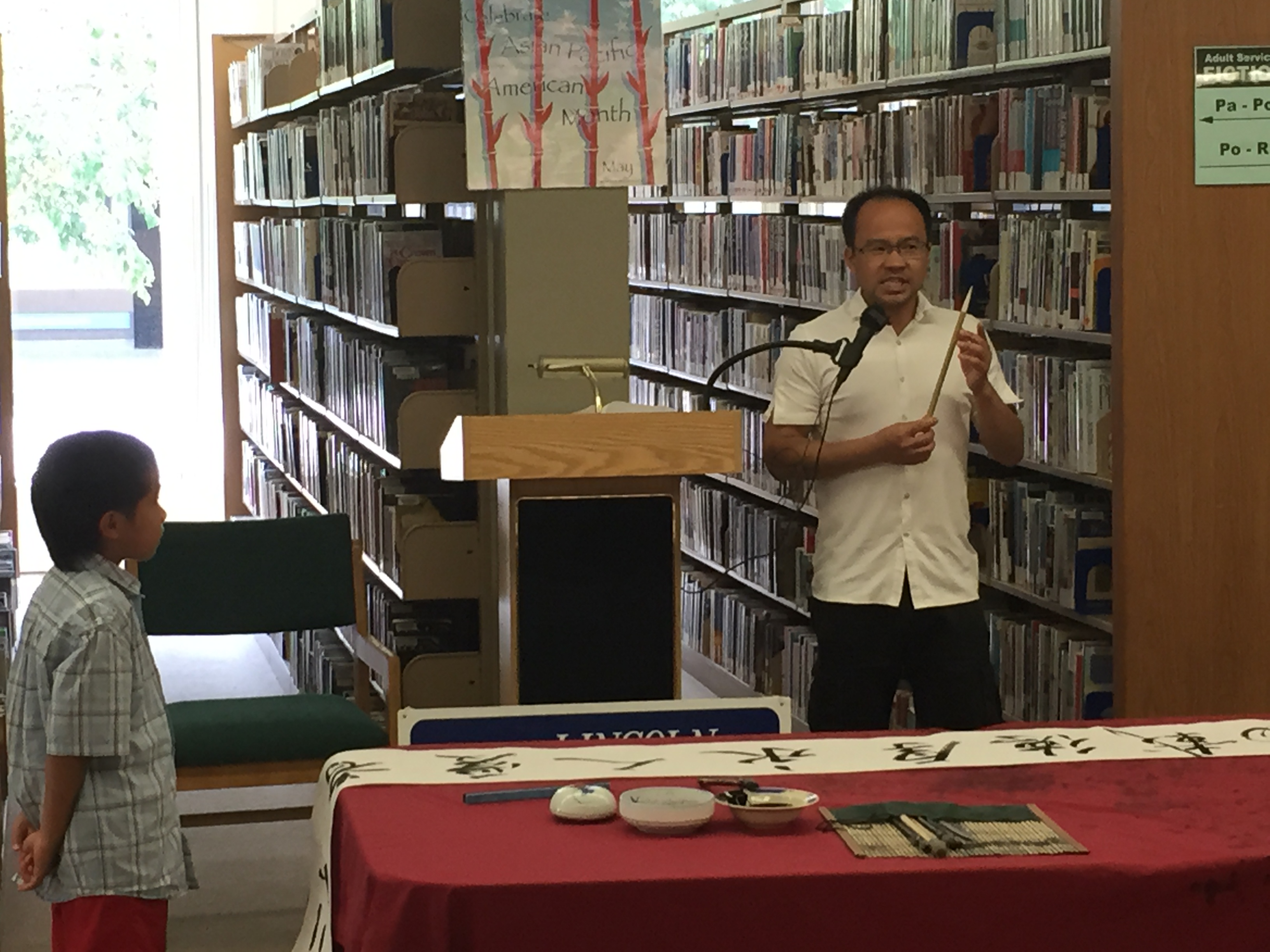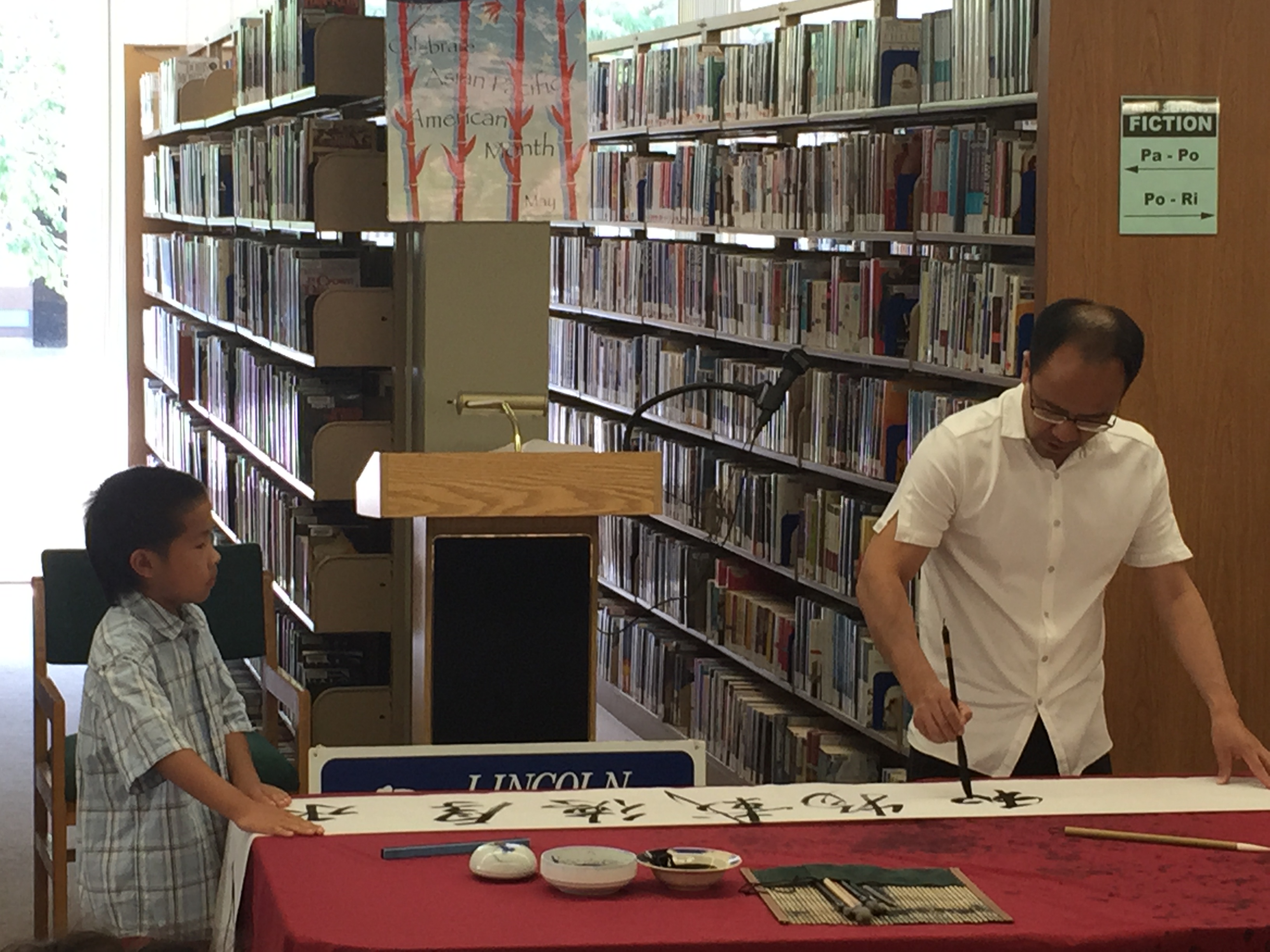May 27, 2015, Zheng Rui gave a brief talk on “Knowing Shufa, Knowing China” at Lincoln Public Library, Nebraska.
Celebration of Asian-Pacific American Heritage Month in the United States dates back to as early as 1978, when President Jimmy Carter signed a Joint Resolution designating the annual celebration. And twelve years later, President George H.W. Bush signed an extension making the week-long celebration into a month-long celebration. In 1992, the official designation of May as Asian-Pacific American Heritage Month was signed into law.
May 27, 2015, as a major celebration of Asian-Pacific American Heritage Month, Chinese artists and students, representatives from different Asian Countries were invited to perform or speak at Lincoln Public Library. Zheng Rui from SIS, Zhejiang University, gave a talk on “Knowing Shufa, Knowing China” while demonstrating Shufa in front of the audience.


And the speech goes as following.
Good afternoon, ladies and gentlemen, Welcome to China!
My name is Zheng Rui, and I came from Hangzhou China last September as a visiting scholar, with Marissa and Peter as my advising professors at the Department of Art and Art History, UNL. But I hope you’ll take me as a friend instead of a foreigner, as I’ve found people around to be very friendly and very helpful, teachers, staff and students at UNL, these American volunteers working at ISF, Ron, Judy, and Mark, just to name a few, as well as my neighbors, Sam, Kitty, and Dylan. And for many times I asked my American friends here in Lincoln, “How can you be so kind to people from another country?” Guess what they said to me! “You shall love your neighbor as yourself.” So, I’d like to take this opportunity to thank them because they love their neighbors even more than themselves.
I believe most of us present today have heard about Mencius, who lived between the 4th and 3rd centuries BC, and is one of the greatest philosophers and educationists in Chinese history, told us that “The benevolent love others!”(demonstration:仁者爱人). What I’m trying to say is that no matter we are from the east or the west, we are educated to be good ones!
Now, let’s begin the story of Shufa (the art of Chinese calligraphy) with another story. Most of us still remember in March 2014, Michelle Obama and her daughters paid a 7-day visit to China. During their stay, as a major reception for the guests, Peng Liyuan, the first lady of China demonstrated Shufa personally. And the first ladies both wrote something on that day, which showed the philosophy of the Chinese people (demonstration:厚德载物;永). Why Shufa? In my opinion, there are two major reasons. First, just like people here in U.S., the Chinese people are very hospitable, so they share the best thing they have with their guests. And Shufa is one of the best, if not the best one! It has been widely recognized as the essence of Chinese culture, and taken as the highest art from China by many western scholars. The other reason is: “knowing shufa is knowing China!” As we know, the Chinese people believe Shufa carries their knowledge, talents, dreams, and personalities (demonstration:书如其人). What’s more, when we look back into Chinese history, we find that most of the elites from different fields, philosophers, educationists, poets, scientists, court officials and emperors, etc., were dedicated to Shufa and some of them became highly distinguished in the art.
Why are we talking about Shufa today? I’d like to explain very briefly now. The writing tool we use for the art is hair brush, which is over 2,500 years old according to the archaeological findings in the 20th century. I personally believe the brush to be the most charming part and the secret of the art itself. This pointed and very soft brush is so magical that it can help us stay away from all the distractions and unnecessary pressures in this modern world. Then, “Where is the hair brush taking us”? It takes us into a world deep in our heart. It’s there we find the true, the good and the beautiful. It does not mean we have to become artists ourselves. Instead, the practice helps us know ourselves better, especially our dreams, so that we can fulfill these dreams in our life. If you ever have the experience of writing with the Chinese hair brush, you’ll begin to understand why Shufa has become the art for the entire Chinese population. No matter where they go, they’ll take Shufa with them. What’s more, you’ll begin to understand why the Chinese people stick to the prevailing philosophy that “Peace is most precious (demonstration:和为贵) !”
Before we close this talk, I’d like to share one saying with the kids. (demonstration:开卷有益) This saying first came from Tao Qian, who lived during the 4th and 5th centuries. It literally means “Opening a book is beneficial”! And Grace Li, principal of the Lincoln Chinese School translated it into “Reading enriches the mind.”
Thanks you!
Welcome to China!
Zheng Rui
Bennet Martin Public Library
May 27, 2015



